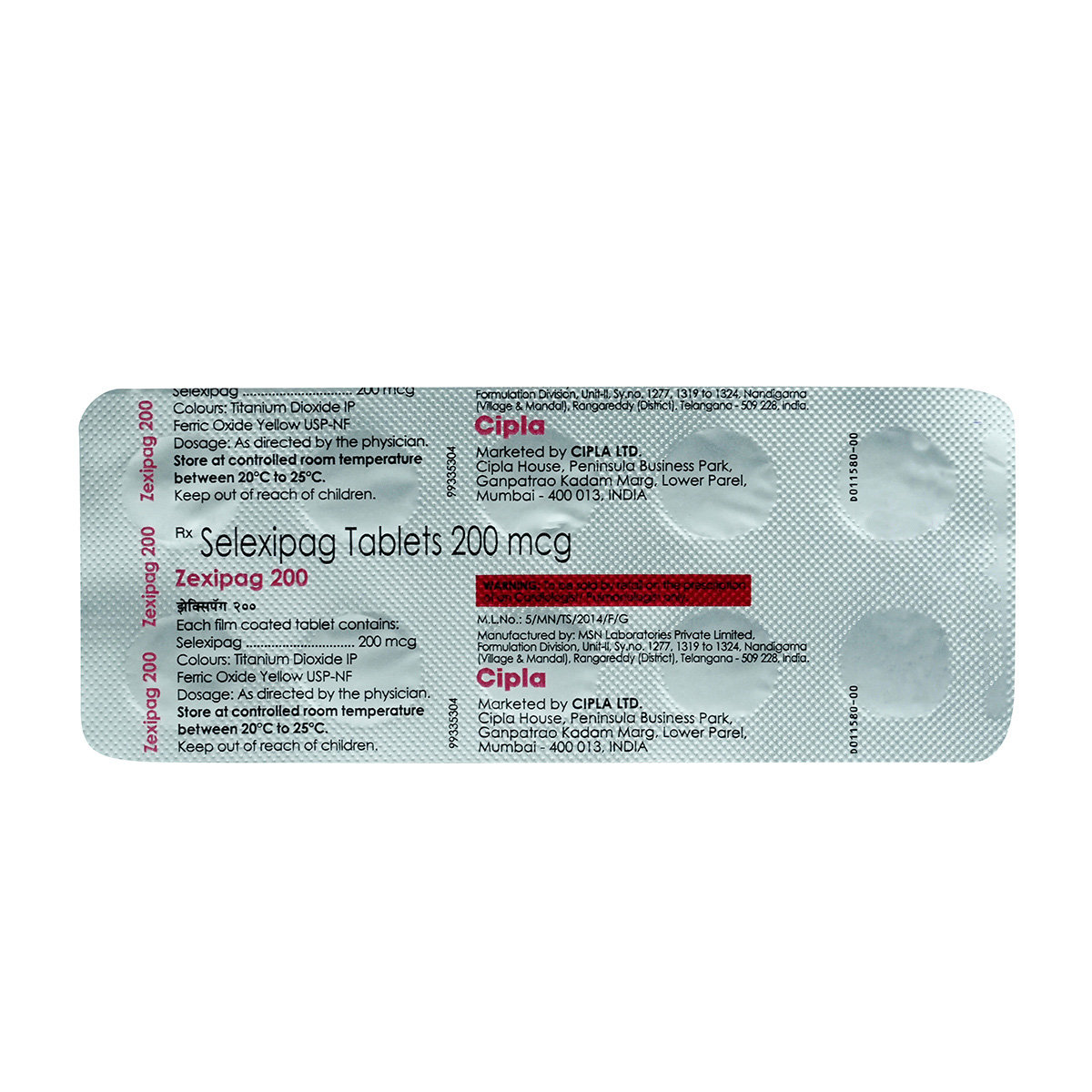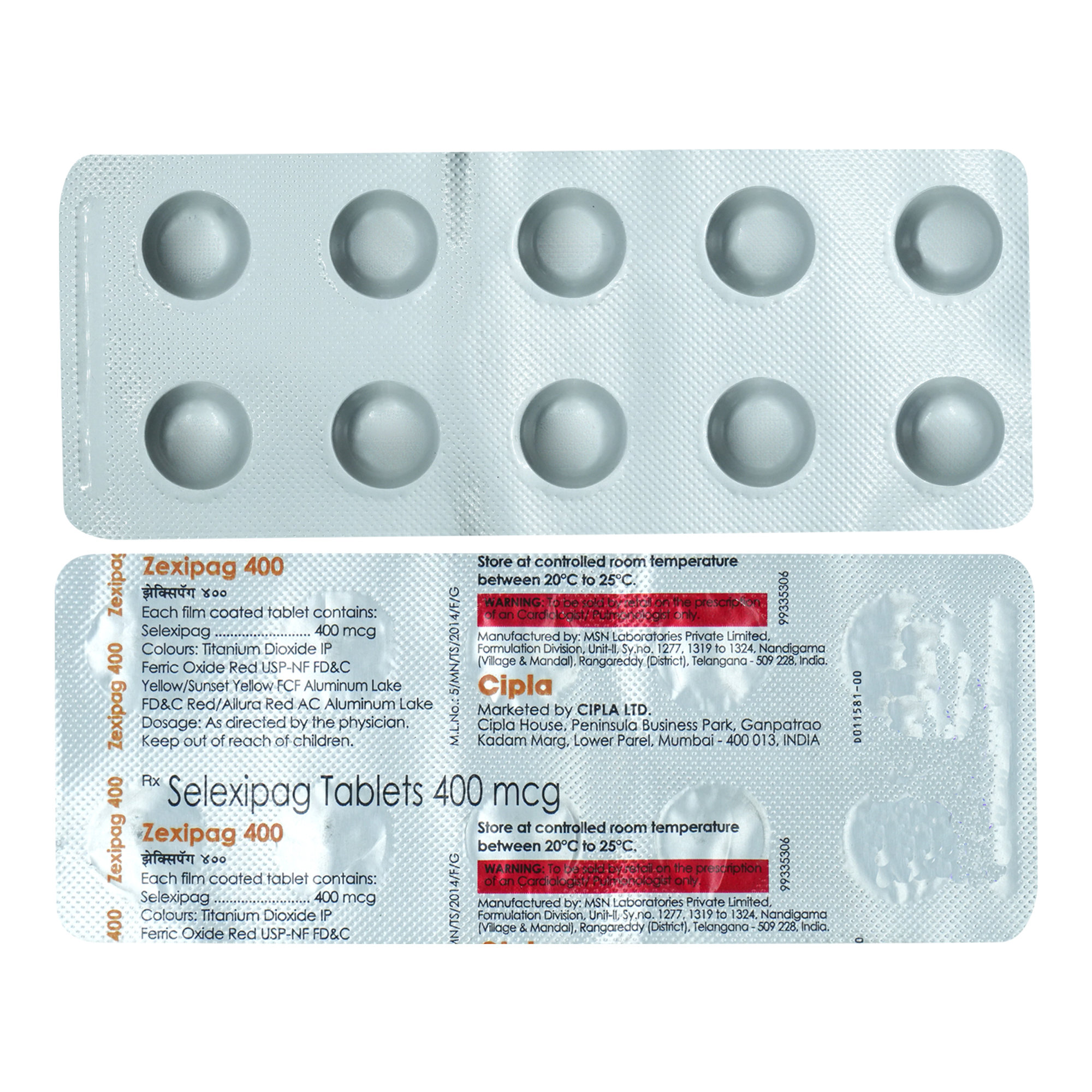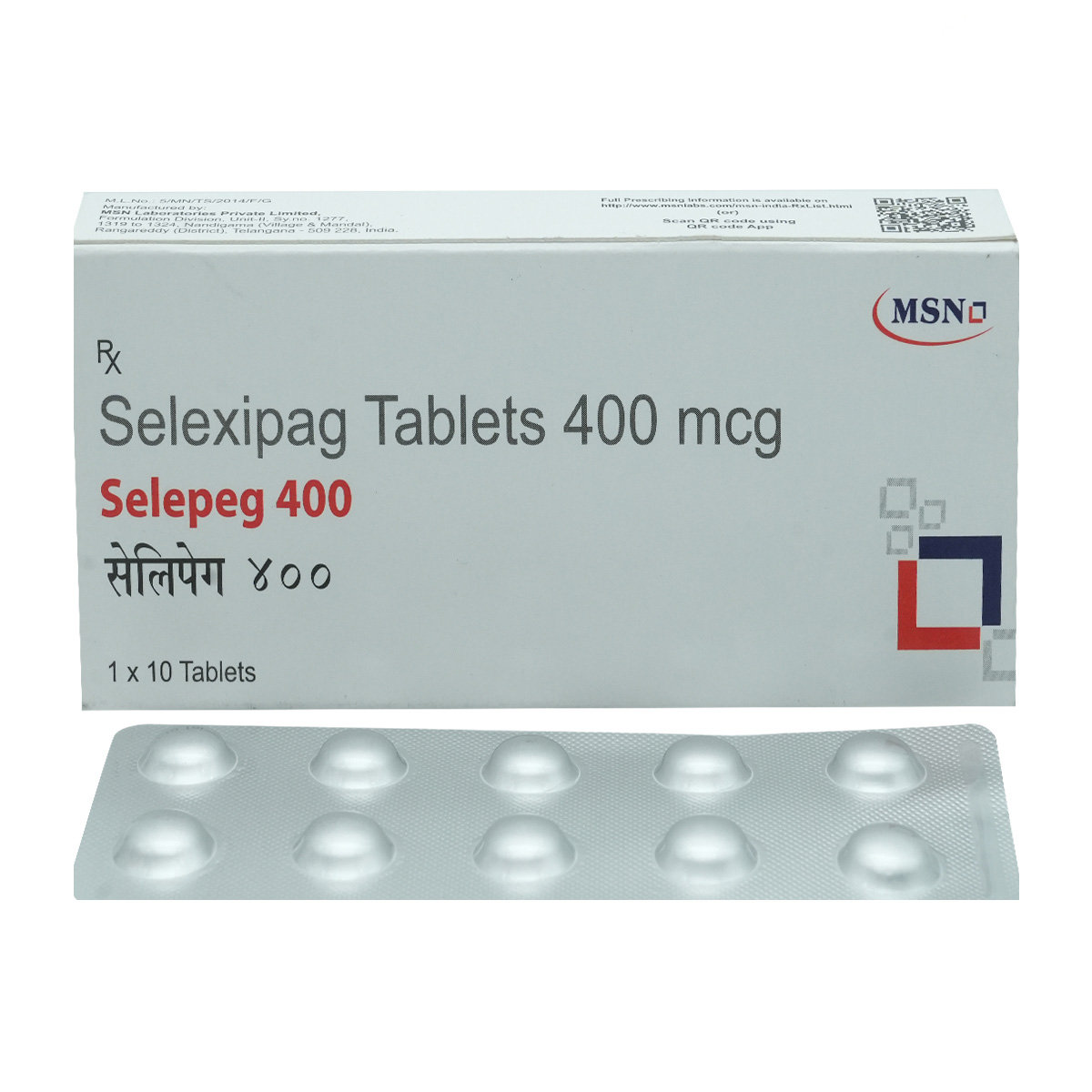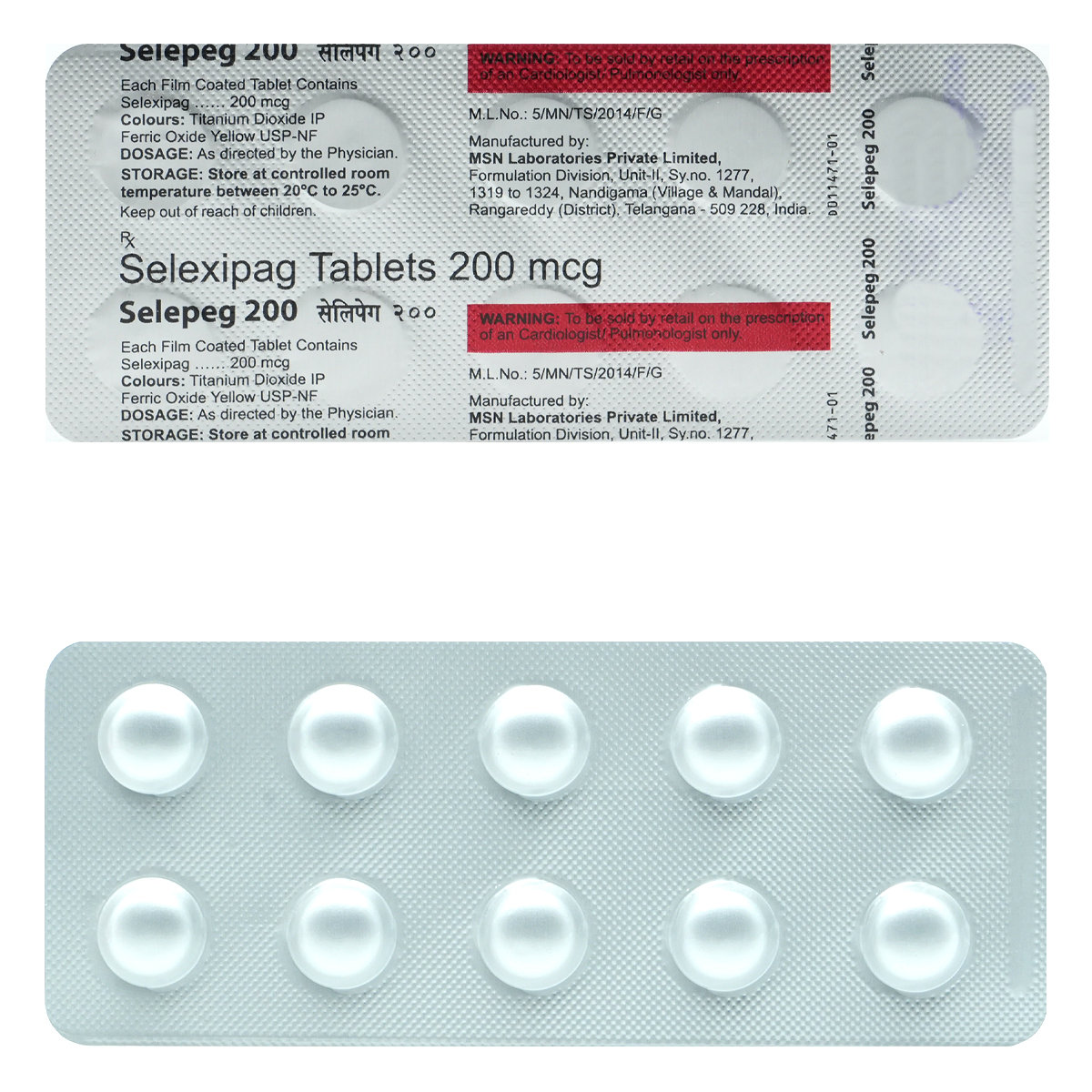Selexipag
About Selexipag
Selexipag belongs to the group of medicines called selective non-prostanoid IP prostacyclin receptor agonists used to treat pulmonary arterial hypertension (high blood pressure in the lungs), to slow down the worsening of symptoms and to reduce the chance of hospitalisation.
Selexipag contains Selexipag, which works by widening the pulmonary arteries and reducing their hardening. This makes it easier for the heart to pump blood through the pulmonary arteries. Thereby, it lowers the pressure in the pulmonary arteries.
In some cases, Selexipag may cause side effects such as headache, nausea, vomiting, diarrhoea, and stuffy nose. Most of these side effects may not require medical attention and resolve gradually over time. However, if the side effects persist or worsen, consult the doctor.
Do not take Selexipag if you are pregnant or breastfeeding. Selexipag is not recommended for use in children as safety and effectiveness have not been established. Keep your doctor informed about your health condition and medications to rule out any side effects/interactions.
Uses of Selexipag
Medicinal Benefits
Selexipag belongs to the group of medicines called selective non-prostanoid IP prostacyclin receptor agonists used to treat pulmonary arterial hypertension (high blood pressure in the lungs), delay disease progression and lower the risk of hospitalisation for pulmonary arterial hypertension. Selexipag contains Selexipag, which works by widening the pulmonary arteries and reducing their hardening. This makes it easier for the heart to pump blood through the pulmonary arteries. Thereby, Selexipag lowers the pressure in the pulmonary arteries, relieves symptoms of pulmonary arterial hypertension and slows down its progression.
Directions for Use
- Take Selexipag with food to reduce stomach upset.
- Recommended to take twice a day or as advised by your doctor.
- Swallow the medicine as a whole with a glass of water.
- Do not crush, break, or chew it.
Storage
Side Effects of Selexipag
- Headache
- Flushing (reddening of the face)
- Nausea
- Vomiting
- Diarrhoea
- Nasopharyngitis (stuffed nose)
- Jaw pain, joint pain, muscle pain, leg pain
Drug Warnings
Do not take Selexipag if you are allergic to any of its components, if you have/had heart problems such as unstable angina, severe coronary heart disease, heart attack within last six months, weak heart, severe irregular heartbeat, defect of heart valves, or if you had a stroke within the last three months, reduced blood supply to the brain, or if you are taking gemfibrozil. Inform the doctor if you have low blood pressure associated with dizziness, severe diarrhoea or vomiting, thyroid problems, severe kidney problems, undergoing dialysis, severe liver problems, or if you are taking medicines for high blood pressure. Do not take Selexipag if you are pregnant or breastfeeding. Selexipag is not recommended for children. Let the doctor know if you are taking any other medicines, including supplements or herbal products.
Drug Interactions
Drug-Drug Interactions: Inform the doctor if you are taking fibrates (gemfibrozil), antiplatelet (clopidogrel), iron chelators (deferasirox), immunomodulatory agent (teriflunomide), anticonvulsant (carbamazepine, phenytoin, valproic acid), anti-gout (probenecid), or antibiotic (fluconazole).
Drug-Food Interactions: No interactions found.
Drug-Disease Interactions: Inform the doctor if you have unstable angina, severe coronary heart disease, heart attack, weak heart, severe irregular heartbeat, defect of heart valves, stroke, or reduced blood supply to the brain.
Drug-Drug Interactions Checker List:
Safety Advice

Alcohol
consult your doctorIt is not known whether Selexipag interacts with alcohol. Please consult your doctor.

Pregnancy
unsafeSelexipag is not recommended during pregnancy. Consult the doctor if you become pregnant during treatment with Selexipag.

Breast Feeding
unsafeIt is not known if Selexipag passes into breast milk. Selexipag is not recommended during lactation.

Driving
cautionSelexipag may cause headaches and low blood pressure, affecting your ability to drive. Drive or operate machinery only if you are alert.

Liver
cautionSelexipag is not recommended for patients with severe liver impairment. Dose adjustment may be needed in people with moderate hepatic impairment. Consult the doctor if you have liver problems.

Kidney
cautionPlease consult the doctor if you have any concerns regarding the usage of Selexipag in patients with kidney impairment.

Children
unsafeSelexipag is not recommended for use in children below 18 years as the safety and effectiveness have not been established.
Habit Forming
Diet & Lifestyle Advise
- Lower your intake of salt. This helps in reducing the risk of developing oedema.
- Include vegetables, fruits, whole grains, lean meats, poultry, fish, and fat-free/low-fat dairy products in your diet.
- Avoid canned foods, processed foods, pickled, and frozen foods. Instead, consume fresh foods.
- Limit consumption of caffeine and alcohol as they can alter blood pressure.
- Monitor fluid intake to prevent swelling/fluid retention.
Special Advise
- Women of childbearing potential must use effective contraceptives while on treatment with Selexipag.
Patients Concern
Disease/Condition Glossary
Pulmonary arterial hypertension (PAH): PAH is high blood pressure in the blood vessels that carry blood from the heart to the lungs (pulmonary artery). It occurs due to narrowed or blocked blood vessels, which increases the workload on the heart. Symptoms include tiredness, dizziness, shortness of breath, chest pain, and swelling in the legs and ankles.
FAQs
Selexipag is used to treat Pulmonary arterial hypertension (PAH).
Selexipag relaxes the blood vessels in the lungs and allows the blood to flow easily. Thereby, it relieves the symptoms of pulmonary arterial hypertension and slows down its progression.
Do not stop taking Selexipag on your own. Selexipag helps control the symptoms of PAH but does not cure it. Therefore, continue taking Selexipag for as long as it has been prescribed by the doctor.
Selexipag should be used with caution in patients older than 75 years as there is limited experience in this age group. Consult the doctor if you have any concerns.
Let the doctor know if you are taking gemfibrozil, a medicine used to lower fat levels in the blood. If you are taking gemfibrozil, your doctor may tell you not to take Selexipag.






